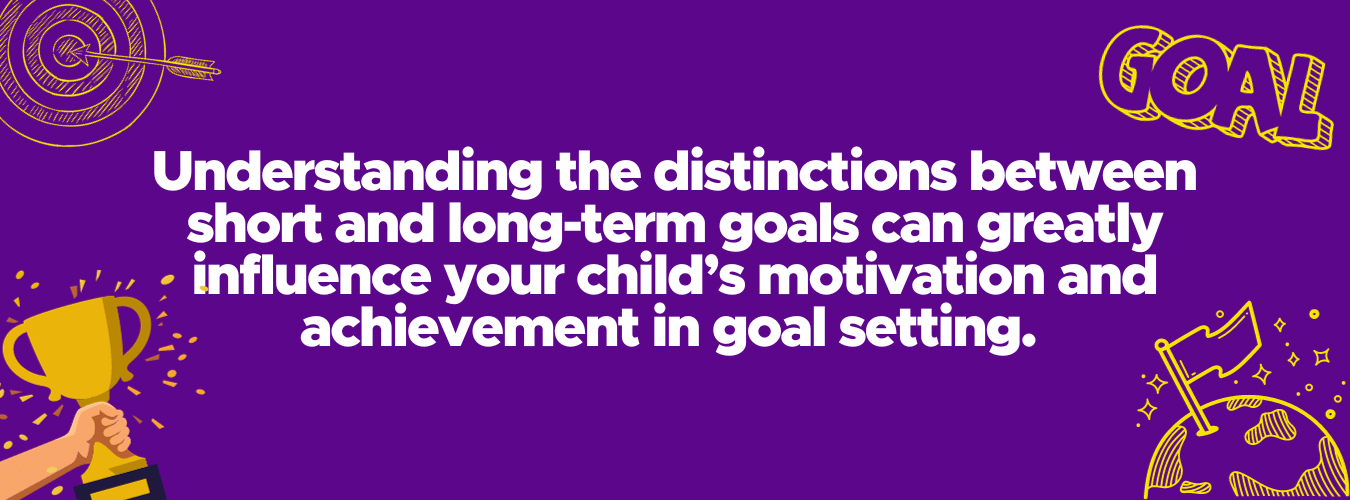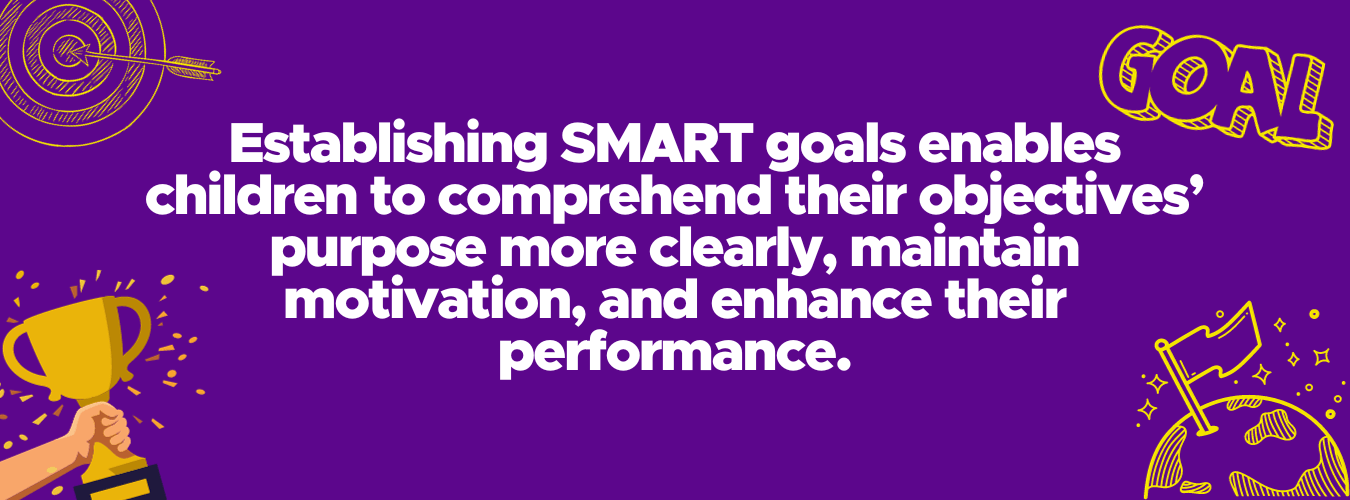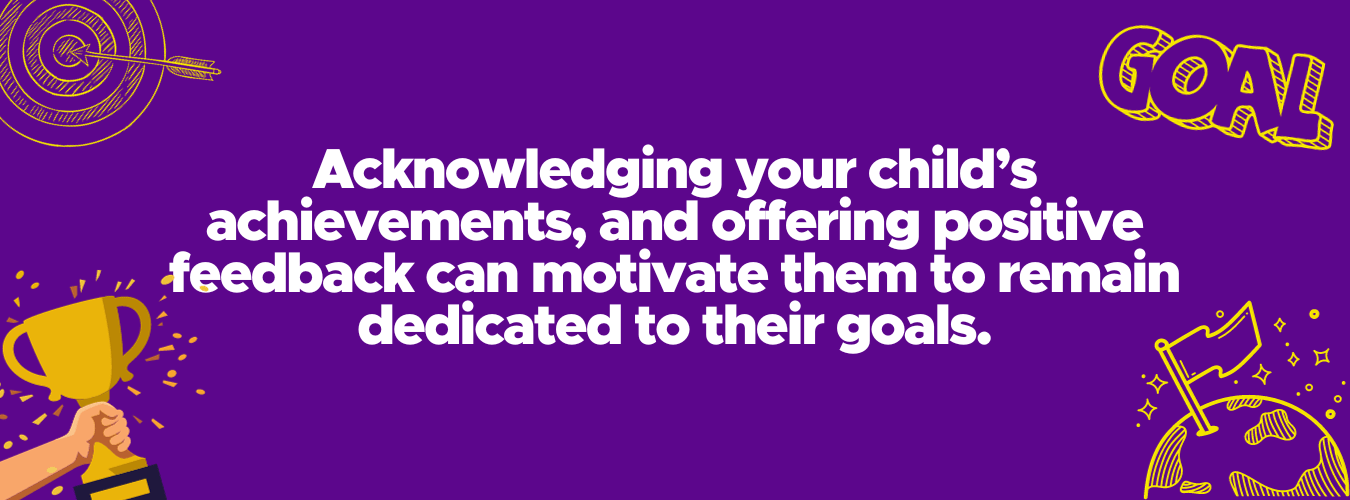Crafting Short and Long-Term Goals for Kids

Setting goals is an essential skill that can profoundly impact a child’s growth and success. It not only helps them stay motivated but also teaches valuable life skills.
In this blog post, we will dive into the world of goal setting for kids, discussing the differences between short and long-term goals for kids, teaching children how to set SMART goals, building good habits, and helping them stay motivated and focused on their goals. It’s time to empower your child to reach their full potential!
Is your child struggling to keep up with schoolwork? Are they falling behind? Are they bored in class? Or are you looking for extension work for your child? Check out our eBook to learn more about how we help your child improve academically and build confidence through our in-centre after-school tuition.
Understanding the Differences: Short and Long-Term Goals for Kids
Understanding the distinctions between short and long-term goals can greatly influence your child’s motivation and achievement in goal setting. Short-term goals can be accomplished within a few weeks or months, providing a quick boost of confidence and motivation.
On the other hand, long-term goals may take years to accomplish and require consistent effort and dedication. Children can enjoy immediate success while striving for more substantial, enduring accomplishments by setting both short and long-term goals.

Short-Term Goals
Short-term goals for kids are empowering and can help foster confidence, as they can be accomplished within a few weeks or months.
Examples of short-term goals that can be motivating include saving for a toy, completing a school project, or learning a new skill. Setting these goals can provide children with a roadmap to success, helping them break down their long-term goals into achievable steps.
Parents significantly contribute to maintaining their children’s enthusiasm and drive towards their short-term goals. Offering words of encouragement, leading by example, and monitoring their progress can significantly impact your child’s motivation to achieve their goals.
Long-Term Goals
Long-term goals are ambitious objectives that take sustained effort and commitment to accomplish. Setting these goals can give children a sense of purpose and direction, helping them stay motivated and focused on their goals.
Teaching Children How to Set SMART Goals
Teaching children how to set SMART goals can significantly improve their motivation and accomplishments. SMART goals are:
- Specific
- Measurable
- Achievable
- Relevant
- Time-based
These criteria ensure that goals are clear, focused, and easy to track. Establishing SMART goals enables children to comprehend their objectives’ purpose more clearly, maintain motivation, and enhance their performance.
The ‘goal ladder’ is a beneficial tool for setting SMART goals, aiding in segmenting a large, long-term objective into manageable short-term steps. This visualization tool can keep children motivated and focused on improving and practising the skills needed to reach their “big goal.”

Specific
Motivating children to set precise objectives is instrumental to their success. Vague goals are less likely to inspire change, while specific goals can help children take the necessary steps to achieve their desired outcomes and reach their full potential.
Measurable
Establishing quantifiable targets is a key component of the SMART goal-setting framework. Measurable goals can be quantified or tracked using specific criteria or metrics, making them incredibly useful for keeping track of progress.
For example, if your child has a goal to improve their math skills, setting a goal like “score ten points higher on my next math test” provides a clear measure of progress.
Measurable goals help create positive habits and recognise every success along the way. By focusing on measurable goals, children can better understand their progress, adjust their efforts accordingly, and celebrate their accomplishments.
Achievable
Another vital element of the SMART goal-setting framework is confirming that goals are attainable. Setting unrealistic goals can lead to frustration and demotivation, while achievable goals can boost confidence and maintain motivation.
To set achievable goals, children should break down their big goals into smaller, more manageable ones and focus on setting realistic short-term goals.
Relevant
Establishing pertinent objectives is crucial for keeping children motivated and concentrated on their goals. Relevant goals are those that matter to the child and align with their overall life objectives. By setting relevant goals, children can focus their energy on what truly matters to them and develop a sense of purpose and direction.
Time-Based
Setting a deadline is a fundamental aspect of any SMART objective. Setting a deadline for a goal provides a target date to work towards, helping children stay focused and motivated.
Breaking bigger projects into smaller parts with individual deadlines can also help children remain focused and motivated, ensuring that they make consistent progress towards their goals.
Helping Your Child Stay Motivated and Focused
Assisting your child in remaining driven and concentrated on their objectives is a key part of their development and achievement. Parents can play a crucial role in fostering motivation by offering encouragement, setting a positive example, and tracking their child’s progress.
Acknowledging your child’s achievements, offering positive feedback, and demonstrating through your example can motivate them to remain concentrated and dedicated to their objectives.
Regularly reviewing their goals and discussing any challenges or successes they encounter along the way can further help them stay on track and maintain their motivation.

Encouragement and Praise
Offering encouragement and commendation can profoundly influence your child’s motivation and self-assurance. Recognising their hard work and applauding their accomplishments can help them feel more confident and inspired to continue working towards their goals.
For example, if your child has a goal to make new friends, offering words of encouragement and celebrating their progress can help them feel more confident in their social abilities. This positive reinforcement can, in turn, inspire them to continue working towards their goal and develop lasting friendships.
Setting an Example
Parents can exemplify positivity by:
- Establishing and accomplishing their objectives, thereby showing their children the importance of setting goals
- Leading by example
- Being a role model for others
- Exhibiting positive qualities and behaviours
These are all essential ways to inspire and motivate your child to set and achieve their goals.
For instance, if you have a goal to exercise regularly, sharing your progress and achievements with your child can inspire them to set their own fitness goals. This approach not only encourages them to work towards their goals but also fosters a healthy, goal-oriented family environment.
Tracking Progress
Monitoring your child’s advancement is crucial for gauging progress and making necessary modifications. It also keeps them accountable and motivated to stay on track.
By regularly reviewing your child’s goals, you can help them stay focused on their objectives and celebrate their accomplishments along the way.
For example, if your child has a goal to improve their math skills, setting weekly check-ins to review their progress can help them stay motivated and focused on their goal. These check-ins also provide an opportunity for you and your child to discuss any challenges they may face and brainstorm potential solutions together.
![]()
Goal setting plays a crucial role in a child’s growth and success. By understanding the differences between short and long-term goals, teaching children how to set SMART goals, building good habits, and helping them stay motivated and focused, we can empower our children to reach their full potential.
It’s time to inspire your child to set and achieve their goals, unlocking their true potential and leading them towards a bright and successful future.
At NumberWorks'nWords, we help our students set short and long-term goals and ensure that they are on the right track to achieving them. Our proven approach to maths and English tutoring helps children to develop foundational skills and close learning gaps while building confidence in their learning.
If you would like to learn more about our tutoring programmes, get in touch with your local centre and book a free assessment today!




